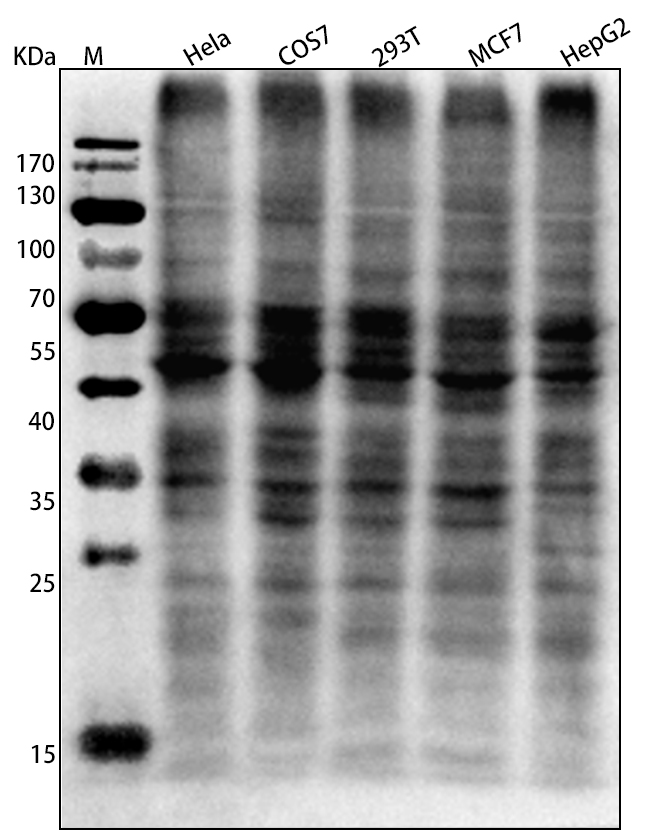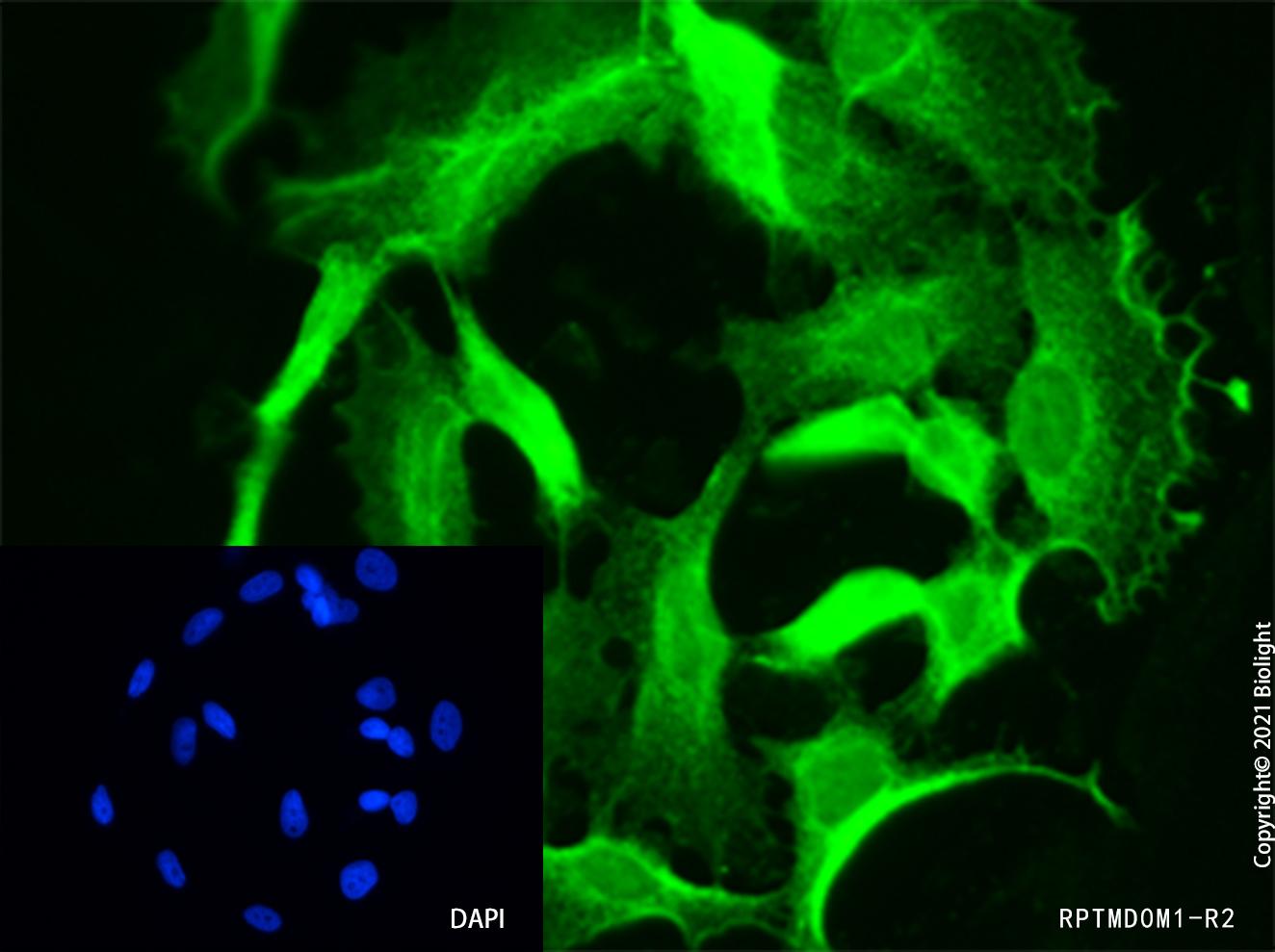
Anti-succinyllysine Antibody, Recombinant Antibody, R2
产品编号:RPTMD0M1-R2
¥ 询价
规格 100ug
浓度 1.3mg/ml
 |
说明书 |
产品名称:Anti-succinyllysine Antibody, Recombinant Antibody, R2
克隆号:R2
抗体亚型:Mouse IgG2b
经验证的应用:WB
交叉反应:Mouse
特异性:Only specifically recognizes succinyllysine modified epitopes.
免疫原:Synthetic peptide
宿主:CHOS/293F
来源:Recombinant Mouse IgG
纯化:Protein A purified
缓冲液:Supplied in PBS, 50% glycerol and less than 0.02% sodium azide, PH7.4
状态:Liquid
应用:The application notes include recommended starting dilutions; optimal dilutions/concentrations should be determined by the end user. WB: 0.5~5ug/ml
使用&储存条件:Shipped at 4℃.Store at 4℃ for frequent use.Aliquot and store at -20℃ for 12 months.Avoid repeated freezing/thawing and violent shaking.Please centrifuge it, before using.
质量验证图:
Figure1.Application in WB Western blot analysisof various cell lines, using RPTMD0M1-R2 at 2ug/ml dilution. Secondary antibody: HRP Goat Anti-Mouse IgG (H+L) at 1:5000 dilution. Blocking buffer: 5% nonfat dry milk in TBST. Detection: ECL Basic Kit .
Figure2.Application in ICCImmunofluorescent analysis of Hela cells, untreated (upside) or treated with Sodium butyrate(2.5mM, 24h), using RPTMD0M1-R2 (green) at 10ug/ml dilution. Nuclear DNA was labelled in blue with DAPI (blue).
别称:Ksu, Succinyl-Lysine
背景信息:Lysine is subject to a wide array of regulatory post-translational modifications due to its positively charged ε-amino group side chain. The most prevalent of these are ubiquitination and acetylation, which are highly conserved among prokaryotes and eukaryotes. Acyl group transfer from the metabolic intermediates acetyl-, succinyl-, malonyl-, glutaryl-, butyryl-, propionyl-, and crotonyl-CoA all neutralize lysine’s positive charge and confer structural alterations affecting substrate protein function. Lysine acetylation is catalyzed by histone acetyltransferases, HATs, using acetyl-CoA as a cofactor. Deacylation is mediated by histone deacetylases, HDACs 1-11, and NAD-dependent Sirtuins 1-7. Some sirtuins have little to no deacetylase activity, suggesting that they are better suited for other acyl lysine substrates. Sirt 5 is a predominantly mitochondrial desuccinylase and demalonylase. In the absence of a known succinyltransferase, succinylation is likely driven by the concentration of succinyl-CoA and intracellular pH and is subject to metabolic fluctuations. Protein succinylation is especially prevalent among mitochondrial metabolic proteins and bacteria, further solidifying the evolutionary link between mitochondria and prokaryotes. It often occurs at lysine residues that are alternatively acetylated or ubiquitinated. More than a thousand lysine succinylation sites were identified on hundreds of proteins including glutamate dehydrogenase (15 sites), malate dehydrogenase, citrate synthase, carbamoyl phosphate synthase 1, and histone proteins.
全称:/
克隆号:R2
抗体亚型:Mouse IgG2b
经验证的应用:WB
交叉反应:Mouse
特异性:Only specifically recognizes succinyllysine modified epitopes.
免疫原:Synthetic peptide
宿主:CHOS/293F
来源:Recombinant Mouse IgG
纯化:Protein A purified
缓冲液:Supplied in PBS, 50% glycerol and less than 0.02% sodium azide, PH7.4
状态:Liquid
应用:The application notes include recommended starting dilutions; optimal dilutions/concentrations should be determined by the end user. WB: 0.5~5ug/ml
使用&储存条件:Shipped at 4℃.Store at 4℃ for frequent use.Aliquot and store at -20℃ for 12 months.Avoid repeated freezing/thawing and violent shaking.Please centrifuge it, before using.
质量验证图:
Figure1.Application in WB Western blot analysisof various cell lines, using RPTMD0M1-R2 at 2ug/ml dilution. Secondary antibody: HRP Goat Anti-Mouse IgG (H+L) at 1:5000 dilution. Blocking buffer: 5% nonfat dry milk in TBST. Detection: ECL Basic Kit .
Figure2.Application in ICCImmunofluorescent analysis of Hela cells, untreated (upside) or treated with Sodium butyrate(2.5mM, 24h), using RPTMD0M1-R2 (green) at 10ug/ml dilution. Nuclear DNA was labelled in blue with DAPI (blue).
别称:Ksu, Succinyl-Lysine
背景信息:Lysine is subject to a wide array of regulatory post-translational modifications due to its positively charged ε-amino group side chain. The most prevalent of these are ubiquitination and acetylation, which are highly conserved among prokaryotes and eukaryotes. Acyl group transfer from the metabolic intermediates acetyl-, succinyl-, malonyl-, glutaryl-, butyryl-, propionyl-, and crotonyl-CoA all neutralize lysine’s positive charge and confer structural alterations affecting substrate protein function. Lysine acetylation is catalyzed by histone acetyltransferases, HATs, using acetyl-CoA as a cofactor. Deacylation is mediated by histone deacetylases, HDACs 1-11, and NAD-dependent Sirtuins 1-7. Some sirtuins have little to no deacetylase activity, suggesting that they are better suited for other acyl lysine substrates. Sirt 5 is a predominantly mitochondrial desuccinylase and demalonylase. In the absence of a known succinyltransferase, succinylation is likely driven by the concentration of succinyl-CoA and intracellular pH and is subject to metabolic fluctuations. Protein succinylation is especially prevalent among mitochondrial metabolic proteins and bacteria, further solidifying the evolutionary link between mitochondria and prokaryotes. It often occurs at lysine residues that are alternatively acetylated or ubiquitinated. More than a thousand lysine succinylation sites were identified on hundreds of proteins including glutamate dehydrogenase (15 sites), malate dehydrogenase, citrate synthase, carbamoyl phosphate synthase 1, and histone proteins.
全称:/



